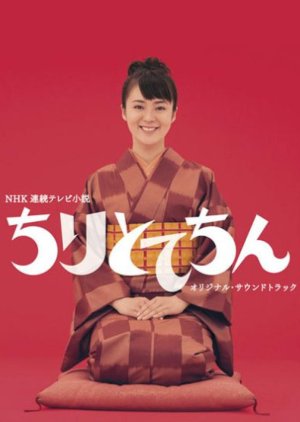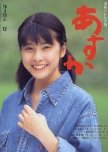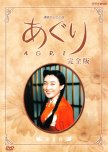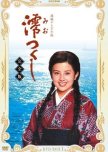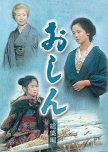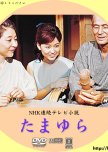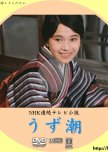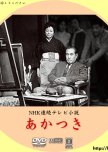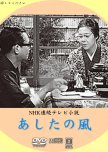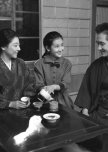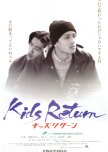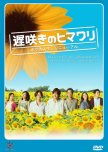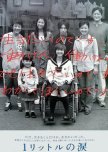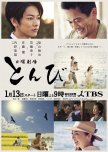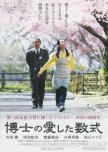
This is when rakugo comes into play. Kiyomi has always relied on her wild and vivid imagination to get away from her humdrum life and before she knows it, she finds herself being engrossed in the rakugo played from the cassette in her grandfather's workshop. Rakugo and laughter have a way of rekindling broken relationships that no word can. Through her bonding with her grandfather and exposure to the enchanting world of imagination named rakugo, Kiyomi gradually comes into her own and decides to stop being Kiyomi B and pursue a career as a rakugo performer.
Acting wise, I'm particularly impressed by Kanjiya Shihori for being able to play a rakogu performer at such a young age (22) and Emi Wakui, showed a new facet of her acting arsenal as a laid-back mother. I like that the series doesn't try too hard to convey a beautiful message about finding your soul like asadora. To add lightness to the series, there are many dream sequences of Kiyomi's fantasy and interludes of her family members reenacting classic rakugo stories. I suspect that part of the reason this series doesn't do too well rating wise (17% on average) is because its theme is rakugo, a 400-year-old tradition that may seem intimidating and old fashioned for the younger viewers in Japan. I consider a series or film to be good when the storytelling is so captivating that it makes you forget your apprehension about a certain theme, and Chiritotechin is one of them.
Vond je deze recentie nuttig?

Deze recentie kan spoilers bevatten
"People are like chopsticks..."
"Chiritotechin" is my tenth asadora. It is also the last one I'm watching before "Natsuzora," in which "Chiritotechin" lead Kanjiya Shihori also appears. "Chiritotechin" was a surprising gem from start to finish. I wished I had watched it prior to the two asadoras I recently finished, "Dandan" and "Manpuku." My gut isn't always right after all lol.Kanjiya plays Wada Kiyomi, a distinctive "negative" heroine for an asadora. By "negative," I mean that she's very pessimistic unlike the stereotypical hard-working, cheerful asadora heroine. Kiyomi's misery seemingly stems by her arrival in Obama, Fukui as a child to discover another girl with the exact same name as her. This begins Kiyomi's never-ending series of "tensai" (a disaster from heaven). "Chiritotechin" finds humor in these "tensai," leading me to quite literally laugh through my tears. Humor is one of the central themes of the series since it's centered around the art of rakugo storytelling. I particularly liked the reenactments of rakugo stories as well as Kiyomi's daydreams.
Besides Kanjiya's great performance, the cast is full of several heavy-hitters. The most notable being Watase Tsunehiko (from "Oshin"!) as Kiyomi's rakugo teacher and Wakui Emi as Kiyomi's hilarious mother. There's also Aoki Munetaka as Soso, Kiyomi's love interest. And Katsura Kichiya, Shigeyama Motohiko, and Kato Toranosuke as her rakugo "brothers" Sogen, Kosojaku, and Shiiso. Kichiya is actually a real-life rakugo storyteller and Shigeyama is a Noh actor. Sato Megumi had a surprisingly nuanced performance of Wada Kiyomi "A" (aka "A-ko") in the second half of the series. I guess that's enough with praising the cast, just know that they are all great. The only character I ended up not liking was Soso's apprentice (played by Tsujimoto Yuuki), but I don't know how the writer expected us to like a pathological liar.
Traditional arts are another central theme of "Chiritotechin." Kiyomi's grandfather and later her father are lacquered chopsticks craftsman. This is where the quote "People are like chopsticks..." comes to play. Designs are put onto the chopsticks between layers of lacquer. Kiyomi's grandfather compares this to People's experiences through life, which turns into something beautiful despite hardships. Her grandfather is also the person who introduces her to rakugo, another traditional art. "Chiritotechin" emphasizes the need to preserve these arts for future generations. As a non-Japanese person, I was surprised to find myself invested in both of these arts.
Equals parts hilarious and heartwarming, "Chiritotechin" made me laugh and cry in turn over and over again. An unforgettable asadora that I will carry with me for some time. I would give it a turn but some of the weeks after Kiyomi's marriage feel like filler (though are enjoyable nonetheless). Speaking of her marriage, the culmination of her unrequited love and subsequent wedding are some of the most hilarious episodes I've ever seen on television. "Chiritiotechin" had somewhat low ratings for an asadora (I think due to the subject matter and the way the series isn't exactly easy to jump into), but attracted die-hard fans. To me, this encompasses the drama perfectly. It doesn't have universal appeal, but if you love you'll LOVE it.
Vond je deze recentie nuttig?

Deze recentie kan spoilers bevatten
Wakui Emi is absolutely PERFECT (no surprise here, LOL), but also most of the remaining supporting cast did a wonderful job, from Matsushige Yutaka to Sato Megumi, from Watase Tsunehiko to Katsura Kichiya, from the lovely Miyajima Mai to Kato Toranosuke, from Kabira Jay to Kimura Yuichi etc. etc. - seriously, it's easier to name the very few exceptions, i.e. the moronic uncle (Kyomoto Masaki is 20 years older than Hara Sachie and the layers of makeup and flashy clothes he wears are supposed to make him look younger, but he ends up giving a strong 50-something-drag-queen vibe; you'll forgive me if I don't find realistic that Natsuko-san falls for him, ne?), the clichè-but-mostly-useless-grandma (I don't like when the elderly are written in scripts as mere ornaments, really; compare this with Churasan's obaa-san and you'll see the difference: now, THAT's an obaa-san, not this ghostly presence!) and the annoying new apprentice, Kososo. Furthermore, rakugo makes for a very interesting and refreshingly original topic (though "Tiger & Dragon" wins hands down there...but that's another story) and throughout the whole dorama, music is an extremely pleasant accompaniment ("Furusato" and the opening credits music most of all!). So why "only" 7/10? Well, sorry if I'm too blunt, but I found both Kanjiya Shihori (whom I also didn't like in the otherwise great movie "Swing Girls") and Aoki Munetaka extremely annoying - and as much as it pains me to write this (me being a Hanshin-fan and whatnot), I have to admit that so was the constant use of Kansai-ben (seriously, now that I've finished watching this, I don't wanna hear another "-hen" nor "-han" for at least six months, LOL!). Anyway, Aoki's character's stage name happens to be perfect for summing up 151-episodes worth of dorama in just two syllables: So-So! :/ Vond je deze recentie nuttig?

